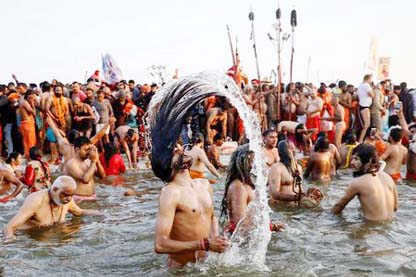
Reuters, Prayagraj :
At the world’s biggest religious festival, the Hindu Kumbh Mela in northern India’s Uttar Pradesh state, the spiritual message for the faithful is deep and profound.
The political message for voters isn’t far behind.
As many as 150 million people are expected to come to the festival city of Prayagraj to bathe at the confluence of three rivers considered holy in Hinduism – the Ganges, the Yamuna, and a mythological third one, the Saraswati. Hindus believe bathing in the Ganges at the time of the Kumbh, this year from Jan. 15 to March 31, absolves people of sins. The federal and Uttar Pradesh state governments – both controlled by Prime Minister Narendra Modi’s ruling Hindu nationalist Bharatiya Janata Party (BJP) – are spending nearly $600 million on the giant event, according to the state government.
Some Hindu religious and political figures say they expect a return on their efforts, not only from the gods, but from voters when Modi battles for a second term in an election that must be held by May.
Hindu activists are also using the event to build support for a hugely controversial project to construct a Hindu temple on the site of the 16th century Babri Mosque that was destroyed by a Hindu mob in 1992. That assault triggered communal riots and led to the deaths of around 2,000 people, many of them Muslim.
Shrikant Sharma, a BJP leader and cabinet minister in the Uttar Pradesh government, denied the Kumbh was being used to score political points ahead of the election, and said people wrongly accuse the party of advocating hardline Hindu causes.
“The Kumbh is a matter of faith for us,” Sharma told Reuters, hours after bathing there. “That’s why we are working there with complete commitment.”
Uttar Pradesh, India’s most populous state and one of its poorest, is funding two-thirds of the money to provide an “unforgettable pilgrimage experience”. The total cost is more than three times the last Kumbh in 2013.
The BJP nearly swept Uttar Pradesh in the last election in 2014, but depressed farm prices, high unemployment and the coming together of two caste-based regional parties have hurt its prospects this year, opinion polls show. A big loss of seats in the state might prevent Modi and the BJP from returning for a second term in New Delhi.
Politics was never far away at two conferences at the Kumbh last week.
Hindu priests and religious leaders sang praises of Modi and the chief minister of Uttar Pradesh, Yogi Adityanath, for the “best ever” Kumbh.
They also called for people to back the BJP to help it build the temple for Lord Ram at the Babri Mosque site in Ayodhya.
At the world’s biggest religious festival, the Hindu Kumbh Mela in northern India’s Uttar Pradesh state, the spiritual message for the faithful is deep and profound.
The political message for voters isn’t far behind.
As many as 150 million people are expected to come to the festival city of Prayagraj to bathe at the confluence of three rivers considered holy in Hinduism – the Ganges, the Yamuna, and a mythological third one, the Saraswati. Hindus believe bathing in the Ganges at the time of the Kumbh, this year from Jan. 15 to March 31, absolves people of sins. The federal and Uttar Pradesh state governments – both controlled by Prime Minister Narendra Modi’s ruling Hindu nationalist Bharatiya Janata Party (BJP) – are spending nearly $600 million on the giant event, according to the state government.
Some Hindu religious and political figures say they expect a return on their efforts, not only from the gods, but from voters when Modi battles for a second term in an election that must be held by May.
Hindu activists are also using the event to build support for a hugely controversial project to construct a Hindu temple on the site of the 16th century Babri Mosque that was destroyed by a Hindu mob in 1992. That assault triggered communal riots and led to the deaths of around 2,000 people, many of them Muslim.
Shrikant Sharma, a BJP leader and cabinet minister in the Uttar Pradesh government, denied the Kumbh was being used to score political points ahead of the election, and said people wrongly accuse the party of advocating hardline Hindu causes.
“The Kumbh is a matter of faith for us,” Sharma told Reuters, hours after bathing there. “That’s why we are working there with complete commitment.”
Uttar Pradesh, India’s most populous state and one of its poorest, is funding two-thirds of the money to provide an “unforgettable pilgrimage experience”. The total cost is more than three times the last Kumbh in 2013.
The BJP nearly swept Uttar Pradesh in the last election in 2014, but depressed farm prices, high unemployment and the coming together of two caste-based regional parties have hurt its prospects this year, opinion polls show. A big loss of seats in the state might prevent Modi and the BJP from returning for a second term in New Delhi.
Politics was never far away at two conferences at the Kumbh last week.
Hindu priests and religious leaders sang praises of Modi and the chief minister of Uttar Pradesh, Yogi Adityanath, for the “best ever” Kumbh.
They also called for people to back the BJP to help it build the temple for Lord Ram at the Babri Mosque site in Ayodhya.

